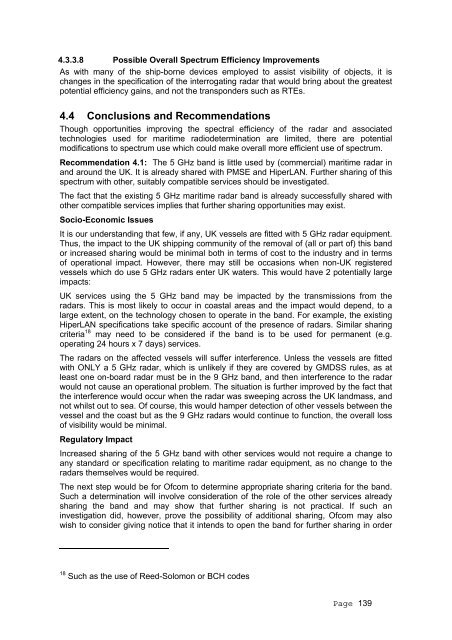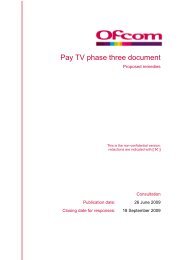FINAL REPORT - Stakeholders - Ofcom
FINAL REPORT - Stakeholders - Ofcom
FINAL REPORT - Stakeholders - Ofcom
Create successful ePaper yourself
Turn your PDF publications into a flip-book with our unique Google optimized e-Paper software.
4.3.3.8 Possible Overall Spectrum Efficiency Improvements<br />
As with many of the ship-borne devices employed to assist visibility of objects, it is<br />
changes in the specification of the interrogating radar that would bring about the greatest<br />
potential efficiency gains, and not the transponders such as RTEs.<br />
4.4 Conclusions and Recommendations<br />
Though opportunities improving the spectral efficiency of the radar and associated<br />
technologies used for maritime radiodetermination are limited, there are potential<br />
modifications to spectrum use which could make overall more efficient use of spectrum.<br />
Recommendation 4.1: The 5 GHz band is little used by (commercial) maritime radar in<br />
and around the UK. It is already shared with PMSE and HiperLAN. Further sharing of this<br />
spectrum with other, suitably compatible services should be investigated.<br />
The fact that the existing 5 GHz maritime radar band is already successfully shared with<br />
other compatible services implies that further sharing opportunities may exist.<br />
Socio-Economic Issues<br />
It is our understanding that few, if any, UK vessels are fitted with 5 GHz radar equipment.<br />
Thus, the impact to the UK shipping community of the removal of (all or part of) this band<br />
or increased sharing would be minimal both in terms of cost to the industry and in terms<br />
of operational impact. However, there may still be occasions when non-UK registered<br />
vessels which do use 5 GHz radars enter UK waters. This would have 2 potentially large<br />
impacts:<br />
UK services using the 5 GHz band may be impacted by the transmissions from the<br />
radars. This is most likely to occur in coastal areas and the impact would depend, to a<br />
large extent, on the technology chosen to operate in the band. For example, the existing<br />
HiperLAN specifications take specific account of the presence of radars. Similar sharing<br />
criteria 18 may need to be considered if the band is to be used for permanent (e.g.<br />
operating 24 hours x 7 days) services.<br />
The radars on the affected vessels will suffer interference. Unless the vessels are fitted<br />
with ONLY a 5 GHz radar, which is unlikely if they are covered by GMDSS rules, as at<br />
least one on-board radar must be in the 9 GHz band, and then interference to the radar<br />
would not cause an operational problem. The situation is further improved by the fact that<br />
the interference would occur when the radar was sweeping across the UK landmass, and<br />
not whilst out to sea. Of course, this would hamper detection of other vessels between the<br />
vessel and the coast but as the 9 GHz radars would continue to function, the overall loss<br />
of visibility would be minimal.<br />
Regulatory Impact<br />
Increased sharing of the 5 GHz band with other services would not require a change to<br />
any standard or specification relating to maritime radar equipment, as no change to the<br />
radars themselves would be required.<br />
The next step would be for <strong>Ofcom</strong> to determine appropriate sharing criteria for the band.<br />
Such a determination will involve consideration of the role of the other services already<br />
sharing the band and may show that further sharing is not practical. If such an<br />
investigation did, however, prove the possibility of additional sharing, <strong>Ofcom</strong> may also<br />
wish to consider giving notice that it intends to open the band for further sharing in order<br />
18 Such as the use of Reed-Solomon or BCH codes<br />
Page 139
















